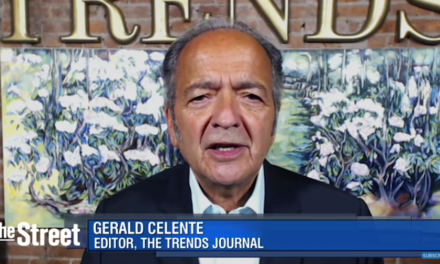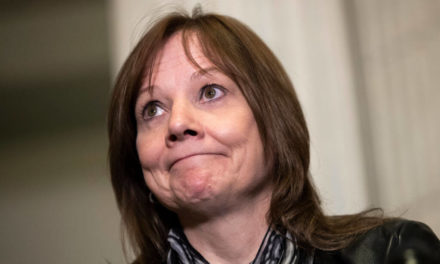Gerald
Celente, publicist van Trends Journal gaf vorige week
vrijdag een interview, waarin hij de wereld
waarschuwt voor het ongelimiteerd geld bijdrukken en het verlagen van
de rente, zaken die grote bedrijven met veel schulden en
aandelenhandelaren ten goede zullen komen…….
Ondanks
dat het goed is voor de aandelenmarkten en bedrijven met grote
schulden, die zo kunnen blijven uitbreiden, is de keerzijde een enorme schuldbubbel in de VS, een schuldenlast van houd je vast: 250 biljoen
dollar!! Vandaar dat Celente dan ook de vergelijking met methadon
maakt (eigenlijk bedoelt hij heroïne): ze blijven het lichaam van
een stier volspuiten, zodat deze blijft rennen, maar de economieën
elders worden er niet mee gestimuleerd en we zien nu dan ook een globale
economische afzwakking…..
Celente
wijst voorts op de waarschuwingen van het IMF en de Wereldbank voor een
recessie door deze enorme schuld….. Miljardair en oprichter van Bridgewater, Ray
Dalio, verklaarde onlangs dat hij nu als Celente vooral inzet op
goud…. Ofwel de directeur van het grootste hedgefonds ter wereld
maakt zich zorgen over een grote depressie (en tegelijkertijd uiteraard een recessie)…….
Mensen
zien wat er gebeurt terwijl de centrale banken geld blijven
bijdrukken en de rentes verlagen, waar de Fed e.e.a. niet langer
quantative easing* (QE) wil noemen (waar het natuurlijk wel QE is,
immers het ‘gereedschap’ daarvoor wordt wel degelijk gebruikt..)….
Verder
stelt Celente terecht dat veel mensen die niets meer bezitten en die
alle vertrouwen in regering en financiële markten zijn verloren in
opstand komen, daarbij noemde hij o.a. Libanon, jammer want daar zijn
de CIA en de Mossad bezig de boel op te stoken, zoals de CIA dat ook
pleegt te doen in Iran, Venezuela en Bolivia, plus alle andere landen waar de VS
de verkiezingen manipuleert, of mensen opstookt in verzet te gaan……. Daarbij worden uiteraard wapens en explosieven geleverd**, als dat niet
werkt kan de VS altijd nog een staatsgreep forceren en als ook dat
niet lukt, begint de VS op basis van een berg leugens een illegale
oorlog tegen zo’n land……..
Ook
noemt Celente Bolivia en verdomd alweer is de opstand daar ingegeven
door de CIA, immers het gaat veel te goed met Bolivia en dat is te
danken aan de opnieuw gekozen socialistische president Evo Morales, kijk daar
heeft de VS de schurft aan, een links land, waar het ook nog eens
goed gaat met de economie……***
Voorts
heeft Celente wel gelijk dat het water het volk aan de lippen staat
in landen als: Ecuador, Chili, Columbia, Spanje en Hong Kong (al heb
ik ook bij die laatste zware bedenkingen, immers er wordt daar in de
eerste plaats niet gedemonstreerd omdat men het het financieel slecht
vergaat en je kan er ook daar donder opzeggen dat de CIA een dikke
vinger in de pap heeft, immers men verwacht dat China uiteindelijk
zal ingrijpen en zo kan men China afschilderen als een nog demonischer staat…) Dit terwijl
de VS de ene illegale oorlog na de andere begint…..
Vergeet bij dit alles niet dat figuren als Celente een zekere politieke macht hebben en deze macht misbruiken om zaken zo te sturen dat zij er voordeel bij hebben….. (niet alleen in de VS, maar ook in het buitenland…)
Het volgende artikel komt van het rechtse Money and Markets en werd geschreven door J.T. Crowe:
Celente:
Fed’s ‘Monetary Methadone’ Causing ‘The Greatest Depression’
Posted
by JT
Crowe | Nov
5, 2019 | Economy, News

Trends
Journal publisher Gerald Celente gave a rather stark interview Friday
in which he said central banks around the world are causing “The
Greatest Depression,” and that we’ve already passed Stage 1 as
unrest builds in more and more countries.
Celente, speaking
with Kitco News,
first commented on the Federal Reserve’s latest interest rate cut,
the third since July — and third since 2008 — essentially calling
it a big mistake for everyone but stock traders and companies with
massive corporate debt.
“It’s
positive for the equity markets and the huge debt that corporations
are taking in to keep expanding. But on the negative end, they’re
just building more debt into the already over $250 trillion debt
bubble,” he said. “So what it is, I call it ‘monetary
methadone;’ they’re just shooting in more money to keep the
addicted bull running. It’s not boosting economies around the world
— we’re looking at a global slowdown.
“The
IMF,
the World Bank, one after another are warning
of a recession.”
Celente
then pointed out that billionaire Bridgewater founder Ray
Dalio has
been following what Trends Journal has written about the beginning of
the gold bull run, and how he came out a couple of weeks later and
said he is bullish on gold.
“This
is the head of the largest hedge fund in the world and then just a
few weeks ago, he said now he’s worried
about a Great Depression,”
Celente said.
“So
the people see it and it’s just artificially being boosted by
central banks injecting more cheap money, lowering interest rates,
and now we have the Federal Reserve — we’re
not going to call it ‘quantitative easing,’ we’re
going to make up another story.
“We’re
pumping in $60 billion a month to buy Treasurys — oh and by the
way, $120 billion a day into the repo markets.”
Celente
went on to say that what the Fed is doing is “only temporary” and
the crash won’t be held off forever.
“You’re
seeing housing sales go back up, mortgage refis go back up because
the money is cheap,” he said. “But the earnings aren’t there,
the debt levels for the consumers are getting heavier and heavier, so
it’s artificially propping it up just like it did since the panic
of ’08. It hasn’t filtered back to society, it’s only gone to
the 1%. And I’m not making that number up. You have three people in
the United States, (Jeff) Bezos, (Warren) Buffett and (Bill) Gates,
who have more money than half of America’s population.
“And
then you go around the world and, according to OxFam, what do they
have? Twenty-six people have more
dough than half the world’s population combined.
So, no, it’s not working. It’s only making it worse.”
So
where should investors go to protect their wealth?
“I
call it the guns, gold and the getaway plan,” Celente quipped after
saying he’s no financial adviser. “Speaking for only myself, gold
is the No. 1 investment, and I’ve
been saying that since I began buying gold in 1970.”
Celente
said he’s long on both physical gold and stocks, including the
“IRA, the GLD ETFs.”
“I
have some silver, but gold is my priority,” he added. “I have
two-thirds gold.”
The
host then mentioned uprisings in a number of countries around the
world and asked what it all means, and Celente said it’s the
beginning of “The Greatest Depression.”
“It’s
signalling the people have had it. Again, the money’s gone to the
1%. When people lose everything and have nothing left to lose, they
lose it, and they’re losing it,” Celente said. “This is part of
The Greatest Depression, it’s Stage 1, it’s already happened.
Millions of people taking to the street, protesting that they don’t
have enough money to live while they’re getting higher taxes,
costing more for everyday living. So they’ve had it and this is
extremely important: All these movements don’t have leaders.
Whether it’s Hong Kong, whether it’s Spain, whether it’s
Lebanon, what’s going on in Iraq with the massive demonstrations,
Ecuador, Chile, Bolivia, Columbia, one after another, no leaders
because the people feel it. And this is part of the Greatest
Depression.
“When
we say it’s going to get worse, when The Great Depression hit,
there were 2 billion people on the planet. We’ve added 5.5 billion
more. They’re out of work, they’re living in poverty, violence
all around them, corruption. So this thing is exploding.”
These
five charts prove that the stock market is on the cusp of crashing by
70%, maybe more. (let op, dergelijke artikelen willen je niet zelden strikken voor de aankoop van bepaalde aandelen of andere financiële producten, Money and Markets staat er bomvol mee)
=============================
* Zie: ‘Lagarde (top ECB): “Je kan beter een baan hebben dan spaargeld”‘ (met een apart artikel over Quantative Easing [QE])
** En niet zelden levert de VS scherpschutters om op het protesterende volk te schieten, om zo de schuld in de schoenen van het bewuste bewind te schuiven, het bewind dat men weg wil hebben, ofwel een false flag operatie…..
*** Zie: ‘Bolivia: bewijs op tafel dat VS aanstuurt op een coup‘





